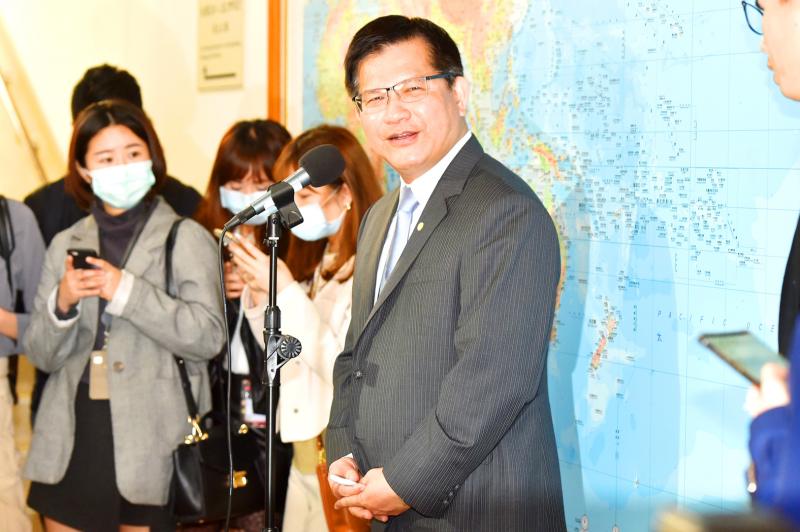The cost of renaming China Airlines (CAL) was the subject of heated debate between Minister of Transportation and Communications Lin Chia-lung (林佳龍) and several lawmakers at a meeting of the legislature’s Transportation Committee in Taipei yesterday.
Lawmakers opposed to the idea said that the name change would cost the nation approximately NT$1.1 billion (US$36.63 million), as well as the reputation the airline has built over the years.
Lin, who has said he was open to the change, was scheduled to brief lawmakers about the government’s bailout plans for airlines, transportation companies and tourism agencies hurt by the COVID-19 pandemic, but lawmakers’ questions focused on the renewed calls in the past few days to change CAL’s name.

Photo: Tu Chien-jung, Taipei Times
Chinese Nationalist Party (KMT) Legislator Hung Mong-kai (洪孟楷) asked Lin if any countries had actually mistaken Taiwan for China when they saw the banners that China Airlines hung on containers of mask donations sent by the government.
Lin said that there had been a few, but did not name them.
The Civil Aeronautics Administration (CAA) has estimated that changing the airline’s name would cost the nation at least NT$1.1 billion, Hung said as he highlighted other issues raised by agency.

Image from Lin Chia-lung’s Instagram feed
Any change in aviation pacts with other nations, including the names of airlines, would require official approval from all those involved in the pact, and delays in reaching such an agreement on a name change could have an immediate effect on the airline’s operations, CAA data showed.
Airport times slots are invaluable and CAL was able to secure good slots for in Tokyo, Bangkok, New Delhi, Los Angeles and Frankfurt, because it was grandfathered in, the agency said.
Changing CAL’s name would cause these airport authorities to reassign their time slots, which could affect CAL’s business and inconvenience its passengers, the CAA said.
A name change would also mean that the airline would have to change the names under which it is registered in the government database, those on its contracts and other documents it has signed with third parties, as well as change its code with the International Air Transportation Association, which would mean it that would have to make changes to its ticketing system and aircraft exteriors, the CAA said.
Independent Legislator Chao Cheng-yu (趙正宇) said that China Airlines has established a brand over the years and that if it changes its name, it might never be able to get the original one back.
He said he hoped that the ministry could find a good solution for the airline.
New Power Party Legislator Chiu Hsien-chih (邱顯智) cited Huang Chu-cheng (黃居正), a law professor at National Tsing Hua University, who said that CAL’s aviation rights would not be altered by a name change, but it might not be able to fly to China afterward.
However, CAL’s subsidiary, Mandarin Airlines, also flies to China and its special administrative regions, so a rebranded CAL could focus on other international destinations, Chiu said.
Another option would be for the government to establish a financial holding firm to buy CAL, with a new airline being used for all international flights other than those to China, which CAL could continue to operate, Chiu said.
Lin said the idea of a name change was nothing new, pointing to the problems that some Taiwanese have encountered with their passports going through customs in many parts of the world.
“China would oppose any change regardless of the reason. However, Taiwan does not represent China and does not want to be represented by China. For now, the government is considering changing the exterior of the [CAL] aircraft,” Lin said.
The public should discuss the issue, and could hopefully come to an agreement on the airline’s name, but the name should distinguish Taiwan from China to avoid any misunderstandings, Lin added.

DEFENSE: The National Security Bureau promised to expand communication and intelligence cooperation with global partners and enhance its strategic analytical skills China has not only increased military exercises and “gray zone” tactics against Taiwan this year, but also continues to recruit military personnel for espionage, the National Security Bureau (NSB) said yesterday in a report to the Legislative Yuan. The bureau submitted the report ahead of NSB Director-General Tsai Ming-yen’s (蔡明彥) appearance before the Foreign and National Defense Committee today. Last year, the Chinese People’s Liberation Army (PLA) conducted “Joint Sword-2024A and B” military exercises targeting Taiwan and carried out 40 combat readiness patrols, the bureau said. In addition, Chinese military aircraft entered Taiwan’s airspace 3,070 times last year, up about

Taiwan is stepping up plans to create self-sufficient supply chains for combat drones and increase foreign orders from the US to counter China’s numerical superiority, a defense official said on Saturday. Commenting on condition of anonymity, the official said the nation’s armed forces are in agreement with US Admiral Samuel Paparo’s assessment that Taiwan’s military must be prepared to turn the nation’s waters into a “hellscape” for the Chinese People’s Liberation Army (PLA). Paparo, the commander of the US Indo-Pacific Command, reiterated the concept during a Congressional hearing in Washington on Wednesday. He first coined the term in a security conference last

A magnitude 4.3 earthquake struck eastern Taiwan's Hualien County at 8:31am today, according to the Central Weather Administration (CWA). The epicenter of the temblor was located in Hualien County, about 70.3 kilometers south southwest of Hualien County Hall, at a depth of 23.2km, according to the administration. There were no immediate reports of damage resulting from the quake. The earthquake's intensity, which gauges the actual effect of a temblor, was highest in Taitung County, where it measured 3 on Taiwan's 7-tier intensity scale. The quake also measured an intensity of 2 in Hualien and Nantou counties, the CWA said.

The Overseas Community Affairs Council (OCAC) yesterday announced a fundraising campaign to support survivors of the magnitude 7.7 earthquake that struck Myanmar on March 28, with two prayer events scheduled in Taipei and Taichung later this week. “While initial rescue operations have concluded [in Myanmar], many survivors are now facing increasingly difficult living conditions,” OCAC Minister Hsu Chia-ching (徐佳青) told a news conference in Taipei. The fundraising campaign, which runs through May 31, is focused on supporting the reconstruction of damaged overseas compatriot schools, assisting students from Myanmar in Taiwan, and providing essential items, such as drinking water, food and medical supplies,